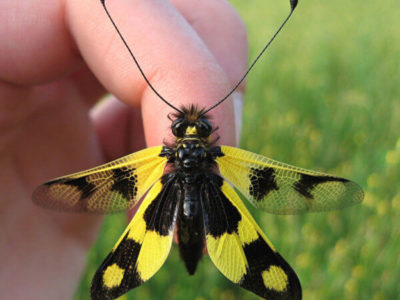What is entomology?
Entomology is the study of insects, so if creepy crawlies make you squeal and jump on the nearest chair, you may want a different major. But if you were that kid who chased butterflies with a net or examined beetles in the backyard, the entomology major will upgrade you from twig-and-grass mason jar terrariums to the big leagues.
1. What You’ll Be Doing
When you sign up for an entomology class, you don’t just examine bugs under a microscope (though that happens, too). The study of insects also means the study of ecology, biology and how insects relate to the areas around them. You learn how entomology applies in agriculture, research, forensics and medicine. “To sum it up, it’s very interdisciplinary,” Kara Tyler-Julian, a University of Florida graduate with an M.S. in entomology, said.
2. The Classes You’ll Take
Unleash your inner Sherlock Holmes as an entomology major. Nancy Miorelli, University of Georgia graduate with a masters in entomology, took a class in forensic entomology. “I love forensic entomology because it’s applied ecology, knowing how species are interacting with each other,” Miorelli said. “It can actually help you solve crimes, and I think that’s the coolest thing ever.” Ian Wright, an evolutionary ecology and behavior major, TA’d a field entomology course that a lot of entomology majors will want to sign up for. “We’d pile students into a van and live on the road for two weeks,” Wright said. “I feel like we got better entomologists out of that than we did in a normal three month course,” Wright said. And, future doctors, get ready to don your white coats. While studying abroad in Ecuador, Giselle Fernandez, an entomology major who graduated from the University of Georgia in 2016, took a medical entomology class that discussed the type of venomous insects that cause medical problems instead of giving you Spidey instincts.
3. Internships for the entomology major
Many entomology students pursue research positions to learn skills they need for future careers. James Kopco, who majored in entomology at Cornell University, had a lab assistant research position as an undergraduate. He created his own experiments to collect data for his honors thesis. “I learned how to set up and run an experiment, how to keep insects alive in captivity, a lot of skills you couldn’t learn in a three credit class,” Kopco said. As a added bonus, Kopco got paid an hourly wage for working in the lab. Morielli took a less traditional route taking a job as a curator for the Insect Zoo. “We had a bunch of exotic species form around the world, and I helped take care of those species. I was also part of the outreach program,” she said. But to really get out in the wild, find a professor who can offer you a field Research Assistant position. Fernandez at UGA was offered an internship in Costa Rica photographing moths to document the wingspans. “It was really cool, actually, I’m kind of sad that I didn’t take him up on it,” Fernandez said.
4. Career Opportunities
1. Science Communicator
If you want an educational job that operates outside of the classroom, you could follow in Miorelli’s footsteps. Miorelli works as a science communicator and guide at the Maquipucuna Ecolodge in Ecuador. “I don’t have a typical day,” Miorelli said. As a science communicator, Miorelli gives presentations on insects and leads day walks to show children insects. Miorelli also helped design an environmental education program to teach kids about insects; for example, she teaches kids how to use insects to test water quality.
2. Crop Consultant
When you look at your food at dinner, you probably don’t consider the role insects play in getting that food to the table–or the role of entomologists in ensuring your vegetables end up on your plate. Tyler-Julian’s first job with her entomology degree was a crop consultant. She went to tomato, pepper and squash farms in South Florida and inspected the fields for pests and diseases, then determined a treatment plan.
3. Mosquito Biologist
Most people see a mosquito, swat it and never think about the smushed bug again (until they have to clean it up). Others think about swatting mosquitos long term and effectively. Currently, Tyler-Julian works in the Lee County Mosquito Control District as a mosquito biologist. Mosquitos breed in salt marshes, so Tyler-Julian gets assigned her own salt marsh area to monitor. She goes up in a helicopter every few days to find indicators of potential mosquito populations, like a body of standing water, the she’ll have the pilot land so she can investigate. She checks for mosquito larvae and determines a treatment plan before she starts an aerial spray (the contents of this spray depend on different factors like the species of mosquito and the temperature of the water).
4. Professor
Of course, if you can major in entomology, there must be those willing to teach the study of insects. “I’ve really developed a love of teaching,” Kopco said. “Hopefully, I’ve been doing a decent job of conveying things in a decently digestible way. I feel like most typical entomologists go on to look for jobs at major research universities to do heavy research works. I’m looking more for what smaller school I could go to where I could focus on teaching.” Order your lesson plans and get ready to impart all you’ve learned to the next generation of eager young entomology students.
5. Staff Research Associate
For those who dream of wearing a white lab coat, suit up. Wright works in a research lab at the University of California at Riverside as a staff research associate. His job includes everything from maintenance and building cages to helping grad students with research and data. “Lab manager, effectively, is what it boils down to,” Wright said. “You run around managing everything that the PI doesn’t have time to do.”
Reviews
“The coolest thing is that the job opportunities are really diverse. Like one of our genetic models is a fruit fly, so you could go into genetics research. You can get into agriculture, you can get into medicine. You can get into pest control, design, education, climate change science. You can pretty much go into any field and relate it back to entomology,” Miorelli said.
“[Entomology] equipped me with all the knowledge and skills I would need to form a solid career as an entomologist, and it allowed me enough flexibility to tailor it to the types of entomology as I wanted.” Kopco said.
“[Entomology] allowed me to have useful skills for finding employment in the economy. People are always looking to get rid of the insects in their houses.”



















